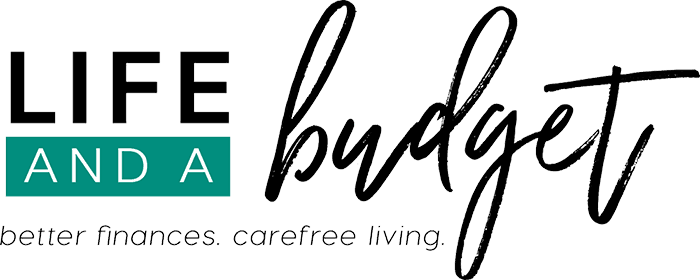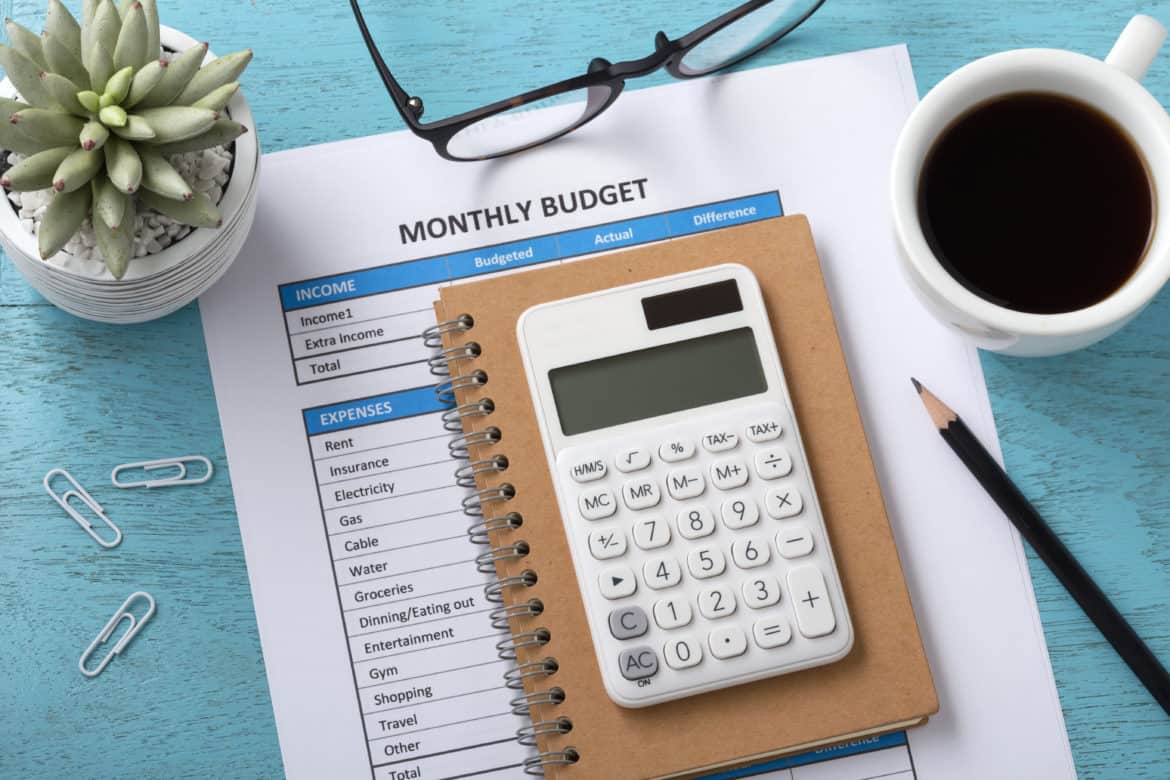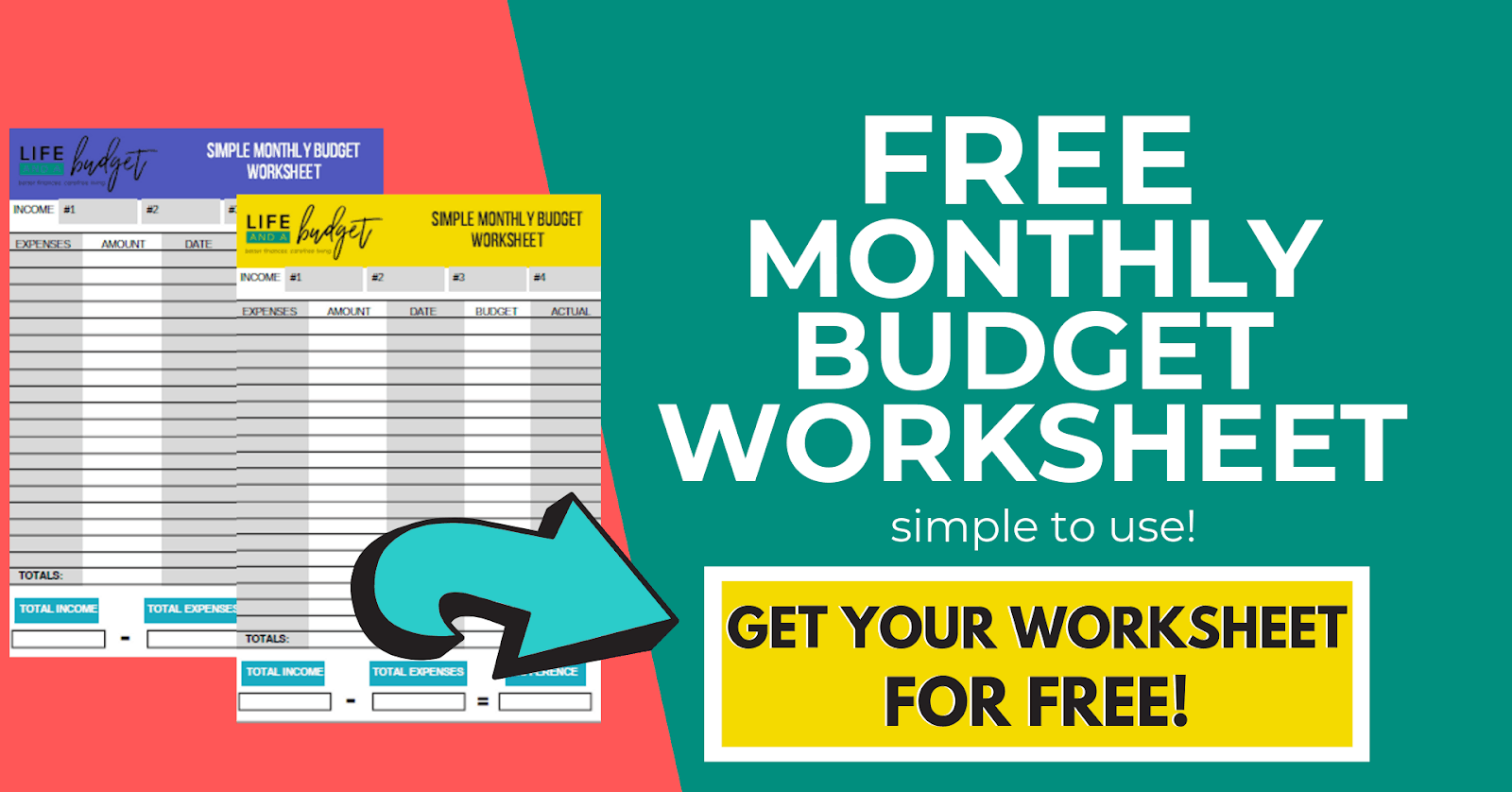 Perhaps you know you need to live on a budget, but you struggle with putting it into practice. If that’s the case, we’re about to dive into 7 tips that will help you get the ball rolling so you can save more, pay off debt, and stop stressing about your finances.
Perhaps you know you need to live on a budget, but you struggle with putting it into practice. If that’s the case, we’re about to dive into 7 tips that will help you get the ball rolling so you can save more, pay off debt, and stop stressing about your finances.
Budgeting is actually a lot easier than it sounds. Yes, the actual thought of putting pen to paper and accounting for your money can be intimidating. Actually knowing and seeing how much debt or how little savings you may have is enough to stress anyone out.
But having a budget is so important for your financial well-being and your peace of mind. Your budget is what can help you meet goals, get out of debt, and actually enjoy your life in the process.
It’s just that self-accountability is often what throws us off.
Being accountable means knowing exactly what’s coming into your bank account and what’s going out, with the goal being never to spend more than you’re making. It also means knowing how to create a budget for living life well!
So, no…holding yourself accountable for your spending habits and learning how to live on a budget isn’t always easy, but it is totally worth it once you get used to doing it. With that said, let’s see if we can uncover some of the tips that will actually make it a tad bit easier for you to turn theory into practice. Plus, I’ll be the guinea pig on your budgeting how-to discovery…stick with me.
How Do I Live on a Budget?
When I graduated in 2006, not only was I broke, I was bankrupt. I had zero dollars in my savings account, thirty-thousand-ish in consumer debt, student loans, and a low-paying, entry-level job.
I hated going to the mailbox because the only thing in there were bills that I couldn’t afford to pay. One evening, just when I thought I’d had enough, I blacked out.
I wasn’t sick or anything unless you consider the stress of dealing with crappy finances a sickness. I was completely overwhelmed and I blacked out and luckily fell onto my air mattress in my unfurnished apartment.
Why?
I’d opened two bills – one for my cell phone bill and one for my electricity bill. I could only afford to pay one and my electricity bill was a final notice. I immediately called my mom as I always did in these situations and she tried to assure me that she would help me as much as she can.
All I can remember after that is throwing my cell phone and hitting the floor. I woke up hours later. I remember because I checked my call log when I came to and it had been hours since that phone call with my mom.
Enough Was Enough – Time to Live on An Extreme Budget
Eventually, I’d had enough. I couldn’t continue the way I was going, so the following week I called a bankruptcy attorney and created my first budget. I mean, how the hell else was I going to afford an attorney?
My first budget was on the back of an envelope and it was not pretty. I had way more credit card minimums than I had money. I couldn’t afford to pay my student loans so I made another crazy decision to enroll back in school so I could defer my payments.
I’d temporarily found a solution to my money woes. I was in bankruptcy so I didn’t have to pay those credit card minimums and I was in school so undergrad loans were thrown into a corner in the back of my mind.
Instead of using the time to live above my means, something I’d done through college, I used this little breathing room to learn how to live on a budget.
I saved for my legal fees, continued making my car payment (so I could keep it as part of my bankruptcy agreement) and opened a savings account.
See, I didn’t start with anything fancy. I simply learned how to live on a budget by writing out my expenses and income each month. So, I know by now you’re probably asking, “How do I start living on a budget?” and how the heck am I qualified to give you advice? Well, these are a few tips that helped me. I’ve experienced financial hell, waded in the waters, and found myself on solid financial ground. I know that if you take this advice to heart, these tips will help you live on a budget and love it too.
7 Tips for Living on a Budget and Loving It!
So, to answer your question, “How do I live on a budget?” These tried and true tips WILL help you navigate a tight budget. These are some of the best ways that have worked in helping me improve my personal finances and I’m certain they will help you too, no matter how little money you may have right now. Take it step by step!
1. Build a system that works for you.
Alright, the first step to live on a budget is to build a system that works for you and only you! I can’t tell you the number of times I’ve tried to force myself to use a budgeting method that just didn’t work for me. I’ve tried them all – 50/30/20, paycheck budgeting, zero-based budgeting, bi-weekly budgeting…you get the drift.
Living on a budget is extremely hard when you try to force budgeting. The method you choose should feel relatively easy. For example, during my single days, my financial situation was much simpler. I used a paycheck/bi-weekly budgeting method because that’s how often I was paid. However, when I got married, I started zero-based budgeting and using a budget binder to help me create a system that worked for my household. I was able to see our total monthly income and create a baseline of how much money needed to come in to meet all of our monthly bills.
The budget binder was just a tool for my budgeting system and there are plenty of tools. You could use software like Mint or YNAB. You could even use a cash envelope system if you want to try budgeting only with cash. I just find it super simple to keep everything electronic and organize our finances in a binder. So, just build a system and choose a tool that works best for your financial planning.
2. Create your budget.
The two main figures you need to create a budget are total income and total expenses. If your expenses exceed your income, it doesn’t matter how well your budget works because you simply don’t make enough money.
One thing I always recommend new budgeters do is keep track of your expenses. This is something that can benefit you even if you’ve been budgeting for some time as well. When you track your expenses, it helps you become aware of where your money is actually going and how much income you need to live comfortably.
Think you only spend $350 on groceries for the month? Maybe you tracked your expenses and found out that you actually spend $550 on groceries. Tracking your spending allows you to base your budget on real numbers and not just assumptions. Challenge yourself to track your spending for at least 30 days so you can set up a budget that is more mindful of your current lifestyle and needs. You can make small changes only if you know the true numbers you’re working with.
If your income exceeds your expenses, a budget will assist you by making sure you are able to take care of your obligations, save for emergencies and pay off high-interest debt like credit cards.
The expenses for your budget will need to include variable and fixed expenses. Variable expenses change from month to month — for example, water, groceries, etc. Fixed expenses stay the same from each month — for example, rent, mortgage payments, insurance payments, etc.
So, before you throw your hands up and determine that budgeting isn’t for you — focus on those two figures…total income and total expenses. It really is as simple as knowing these two numbers!
Here’s some related reading that can help you sort out your income and expenses:
How to Track Your Income and Finance Your Ideal Lifestyle
How to Track Your Monthly Expenses So You Can Stay on Budget
3. Fine-tune your budget.
Now, let’s move to the next step – fine-tuning your budget. Don’t just stop at listing out your income and expenses. You want to fine-tune your budget by making sure it’s accurate and specific to your situation.
After you track your spending and narrow down your expense categories, you may find that there is more money going out than coming in. This can be pretty common at first but you don’t want to leave your budget in the negative.
Go through your expenses line-by-line to see where you could make cuts and reduce costs. Can you lower your cell phone bill or switch to a family plan to save money? Compare with another service provider! Can you shop around for a lower rate on your car insurance? Do you really need your gym membership if you haven’t been going to the gym in a while? If you have credit card debt, can you consolidate your debt into a lower interest rate? Are you buying certain products where there may be a cheaper alternative? As you start to take a good look at the little things and cut expenses, the goal is to see your budget start to even out so things aren’t as tight for you financially.
Remember that you can always focus on earning more money as well to fine-tune your budget. Assess your current skills and interests and see if you can get a raise or promotion at work or explore other job opportunities. If you’re looking to make extra income flexibly, look into getting side gigs where you can offer a service or sell something during your spare time. You may not need a lot of money, but a side hustle can provide you with just enough flexibility to make an impact on an otherwise small budget.
Here’s some related reading to help you fine-tune your budget:
How to Start Couponing For Beginners
Earn Extra Cash: 21+ Ways to Add an Extra $150 to Your Budget
162 Frugal Living Tips to Try in 2020
20 Ways to Find Money For Your Emergency Fund
4. Create a short-term and long-term financial plan.
So how do you start living on your budget? Consider your main reason for budgeting in the first place and how it will affect your life. Is it so that you can regain control of your money? Do you want to pay off debt? Are you tired of not knowing where your money is going or whether you can afford a family vacation?
It’s important to narrow down your goals and create a financial plan so your budget can assist you in the process. Think of it this way. Your budget is a tool. It’s a spending plan that helps you meet both short-term and long-term goals. A short-term goal may be to cover all your bills for the month and have something extra leftover to save.
A longer-term goal may be to pay off all your student loans and go on a nice vacation to Bermuda. Your budget can help you prepare your finances to meet these goals. When you know how much you’re spending and earning, you can easily create a debt repayment and savings plan. You can track the specific amount of money you wish to dedicate toward your goals each month and watch your progress over time.
Thus, it’s important to change how you think about your budget. If you’ve thought in the past that budgeting was too hard or limiting, realize that your budget can actually help provide more freedom now and in the future.
Plus, having your goals in mind can help you feel motivated and excited to live on a budget. It’s so much easier to do something when you know why you’re doing it and can see tangible results.
Here’s some related reading to help you with achieving financial independence:
How to Tackle Your Student Loan Debt
Create a Savings Plan: How to Automate and Build Your Savings
5. Develop Your Own Check-in System
Don’t just set it and forget it when it comes to your budget. This is one of the easiest ways to fall off track and become frustrated with the whole process. Creating a budget is great, but if you want to live on a budget, you have to develop your own check-in system. A good rule of thumb is to review your budget at the end of the month or every pay period.
Go back to your budget and update your categories or mark off when bills have been paid. Since life is constantly changing, your budget may have to be adjusted as well. For example, say you get a windfall in the form of a bonus or tax refund. Take a minute to add this extra income to your budget so you can use it wisely. Unexpected income is a good time to re-evaluate your savings goals, make extra credit card payments, or save extra money.
If an expense pops up that you weren’t prepared for, you’ll need to adjust your budget to accommodate this. Budgets are not set in stone so be flexible. Figure out what you feel comfortable with in terms of tracking your budget and checking in with your finances.
Some people like to use spreadsheets while others prefer to use an app or track with worksheets that can be easily customized.
If you have a partner, make sure you schedule a day and time to sit down together to check in with your budget. Discuss goals and progress, upcoming expenses, and surprise costs, and be sure to log into your financial accounts.
Here’s some related reading to help you develop your own budget check-in system:
How to Organize Your Bills: Never Miss a Payment Again
Free Budget Spreadsheet Template
How to Have a Money Date With Your Spouse
6. Build a Buffer and Don’t Sweat the Small Stuff
If you’re a perfectionist, you have to realize that there is no such thing as the perfect budget. You may never have a month where your income and expenses are the exact amounts that you predicted, and that’s okay.
What’s more important is that you are aware of what’s coming in and what’s going out and use your budget as a tool to improve your financial life. One of my best tips for how to live on a budget is to not sweat the small stuff.
Say you come across some dinner rolls in the grocery store that looks delicious and your kids added some extra snacks to the cart. You decide to buy the items even though they weren’t on your list. Instead of beating yourself up about the extra purchase that was technically off-budget, understand that it’s not going to throw your completely off track.
In the grand scheme of things, it’s much better to build a buffer to cover small costs that creep up during the month. A buffer is an amount of money that you set aside (typically in your checking account) to help cover small last-minute expenses that pop up. If you go over budget a little bit during the month, that buffer will offer you a little room and cover some of the added costs you accrued while also preventing you from going into an overdraft.
That way, you won’t be crushed if you forget about a quarterly subscription fee, have a $100 copay, or get a flat tire on your way home.
How much you set aside for your checking account buffer is totally up to you but you shouldn’t replace a buffer with your emergency fund. Keep your emergency fund in a different account to cover serious unexpected expenses. Then, set aside anywhere from $50 to $500 in a checking account buffer depending on your family size and needs. Having something set aside for your checking account buffer is better than nothing so just stash away what you can when it’s convenient for you.
Here’s some related reading on budgeting and creating a buffer:
3 Reasons Why You Need a Checking Account Buffer
10 Sneaky and Unexpected Expenses You’re Forgetting to Budget For
7. Reward Yourself
If you believe life should be fun, living on a budget should be just as enjoyable. Budgeting simply helps you manage your money and put it to good use. You’re still in control and can decide what to spend and what to save.
There is nothing wrong with enjoying your money. In fact, I recommend you set up a few budget categories to help you do just that. Make sure your budget has room to spend on fun, dining out, brunch with friends, or whatever you enjoy doing.
If you love going to Target and browsing through their dollar section (which is always super impressive by the way), set aside $20 in your budget to spend buying knick-knacks at Target each month.
Or, maybe you want to take a weekend trip with your family. Use your budget to start setting money aside for this regularly. A budget helps you plan for a good life and you get to decide what that life looks like!
Summary: Live on a budget and get ahead!
Yes, you can live on a budget and I’ve just shown you how!
Once you get the hang of budgeting and it becomes a way of life, you’ll find yourself amazed at how you can meet all of your financial goals and for the first time, some of you may be able to turn on automatic bill payments and not stress out about it!
Instead of letting money control you, you can regain control of your life with a solid budget that prioritizes you living a better life.
Have fun customizing your spending categories and exploring ways that you can save and earn more. Speaking of saving and earning more, don’t miss this article on how to get free gift cards (you’re welcome!).
Put regular check-in dates on your calendar to go over your budget and hold yourself accountable. Anyone can learn how to live on a budget and love it even if they’ve struggled in the past and it doesn’t matter whether you’re living on a low income.
How to Create a Budget – Use This Free Monthly Budget Worksheet Printable!
Use this monthly budget worksheet for FREE to help you get started with living on a budget! It’s a one-page printable budget worksheet from the 2023 Budget Binder and a great way to start budgeting.
Use this monthly budget worksheet for FREE to help you get started with living on a budget! It’s a one-page printable budget worksheet from the 2023 Budget Binder and a great way to start budgeting.
It’s perfect for beginners, but if you’re really ready to get ahead and sort out your finances once and for all, I encourage you to purchase the complete budget binder.


